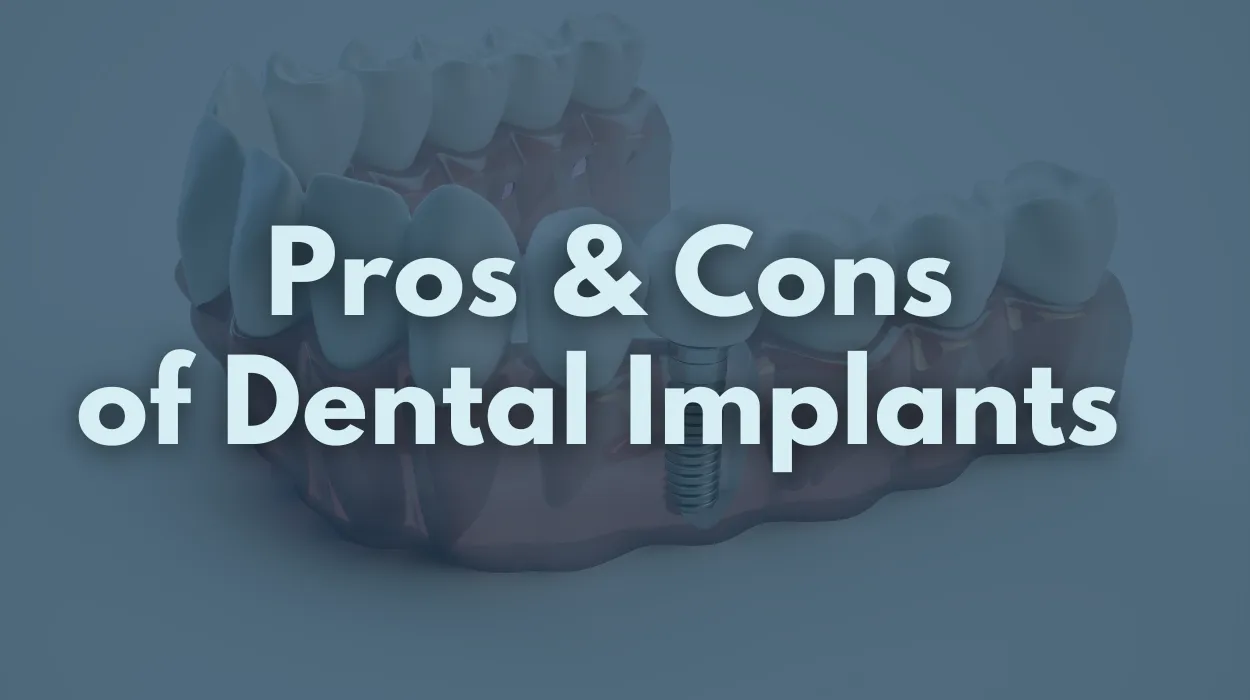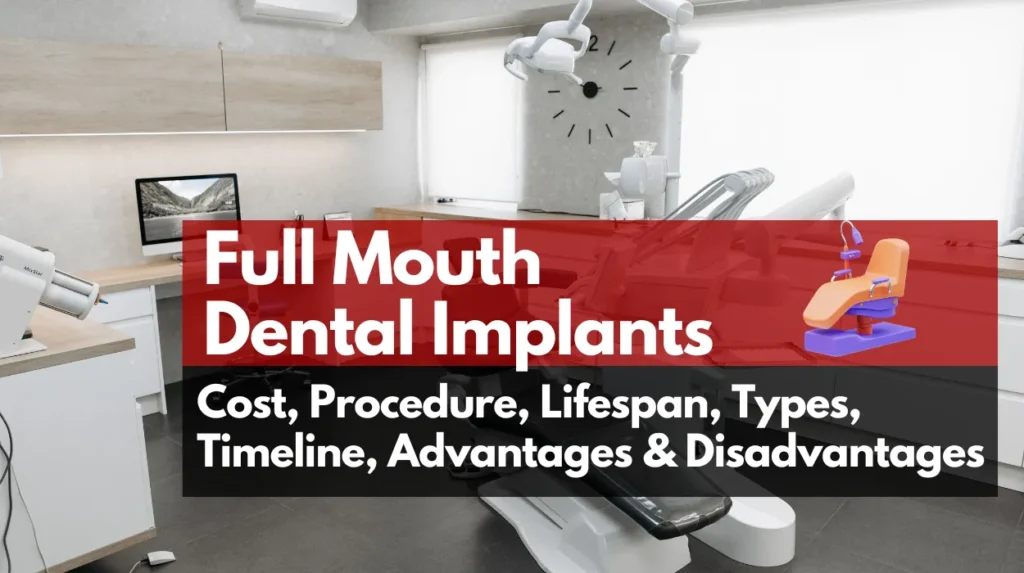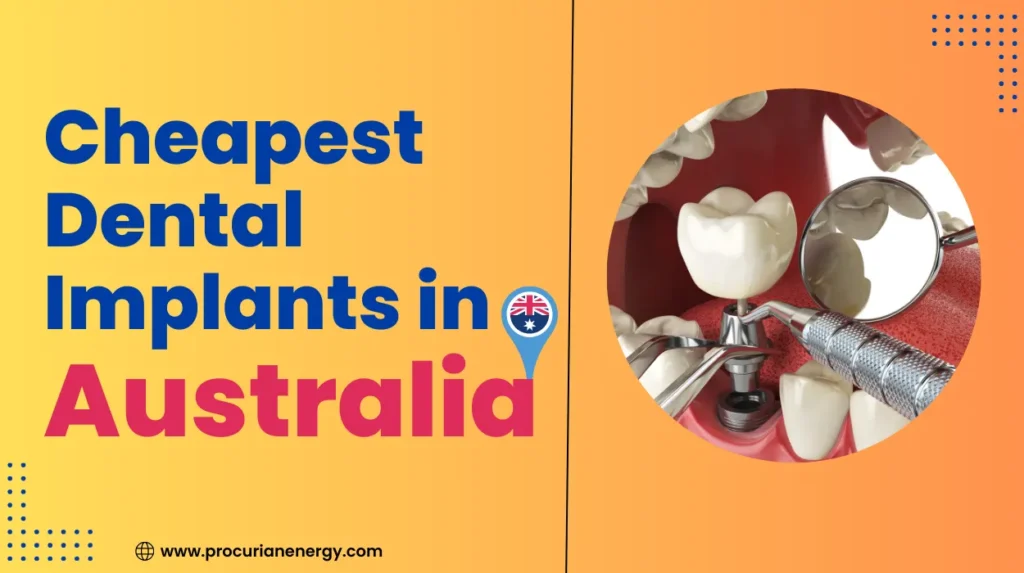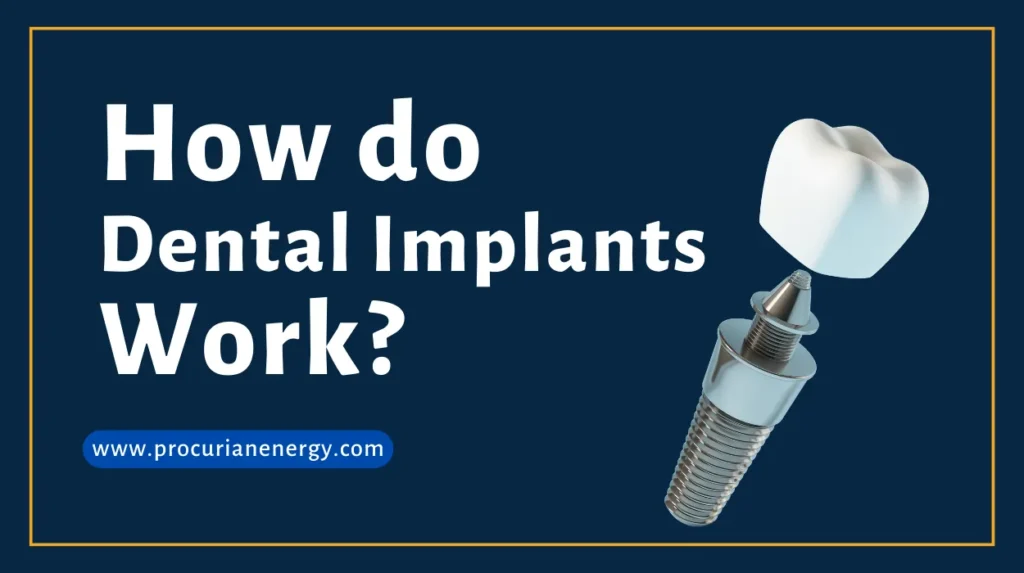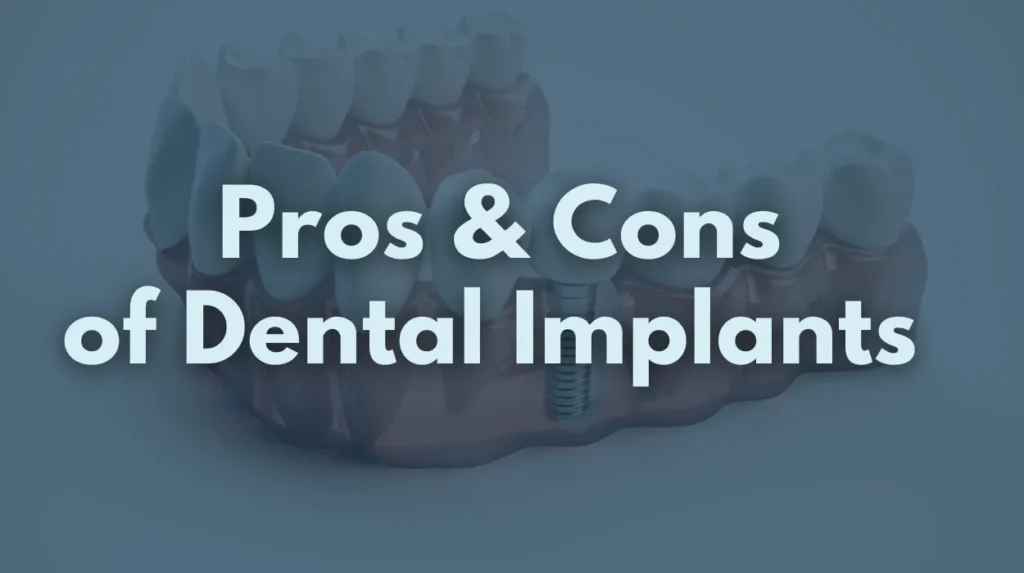
Hello there, everyone! In this blog post, I’ll discuss something that many people are interested in: dental implants.
If you’re missing a tooth or two and wondering how to fill the gap, you’ve come to the right place.
We’ll go over the pros and cons of dental implants so you can make an informed decision about your oral health.
What Are Dental Implants?
Dental implants are artificial tooth roots made of strong materials like titanium. They are surgically implanted beneath the gumline into your jawbone, providing a stable foundation for replacement teeth.
The implants are then fitted with replacement teeth, which can be crowns, bridges, or dentures. Dental implants provide you with a new, natural-looking tooth that feels and functions exactly like the real thing.
Pros of Dental Implants
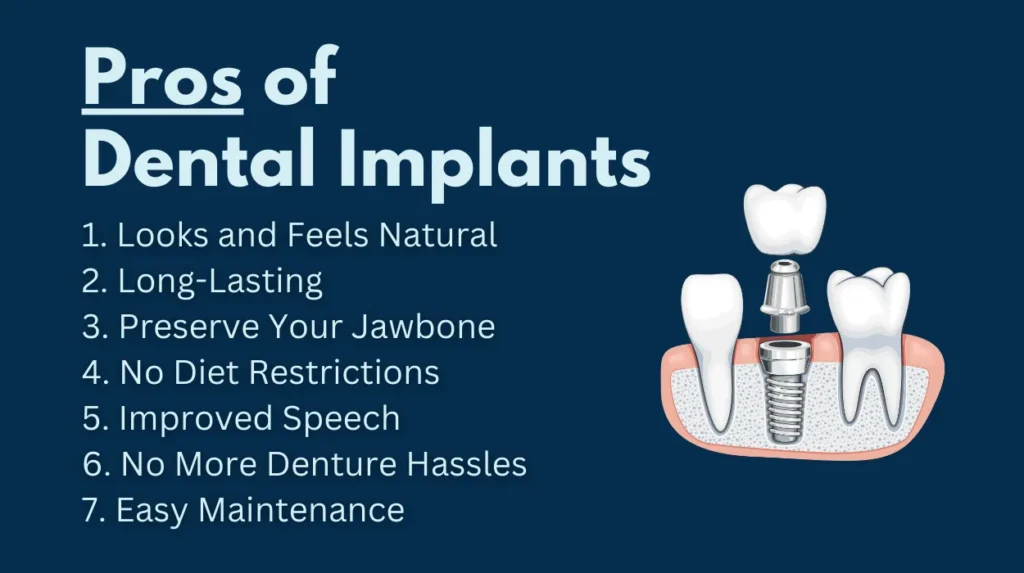
1. Looks and Feels Natural
Dental implants are a top choice because they look and feel just like your own teeth. They blend right in with your smile, and no one will be able to spot the difference. Imagine having a full set of teeth that feel completely natural – that’s what dental implants offer!
2. Long-Lasting
Dental implants are built to last a lifetime with proper care. That means you won’t have to worry about replacing them every few years. It’s like having a trusty sidekick that sticks around for the long haul.
3. Preserve Your Jawbone
When you lose a tooth, your jawbone can start to shrink over time. Dental implants come to the rescue by preventing this bone loss and even helping to grow new bone. Your jawbone stays strong and healthy.
4. No Diet Restrictions
With dental implants, you can eat whatever you like without any worries. There are no restrictions on your diet. Enjoy your favorite foods with confidence, just as you did with your natural teeth. You might get restrictions for 5 to 7days after the surgery.
Here is the list of what can you eat after dental implant surgery.
5. Improved Speech
Missing teeth can sometimes make it hard to speak clearly. Dental implants restore your ability to talk without any hiccups. You’ll be speaking just as clearly and confidently as you used to.
6. No More Denture Hassles
If you’ve struggled with dentures slipping or needing adhesive, dental implants are like a breath of fresh air. They stay firmly in place, so you can forget about those pesky denture issues.
7. Easy Maintenance
Taking care of dental implants is as easy as looking after your regular teeth. All you need to do is brush and floss, and don’t forget to schedule those routine dental check-ups. It’s simple and hassle-free.
Cons of Dental Implants
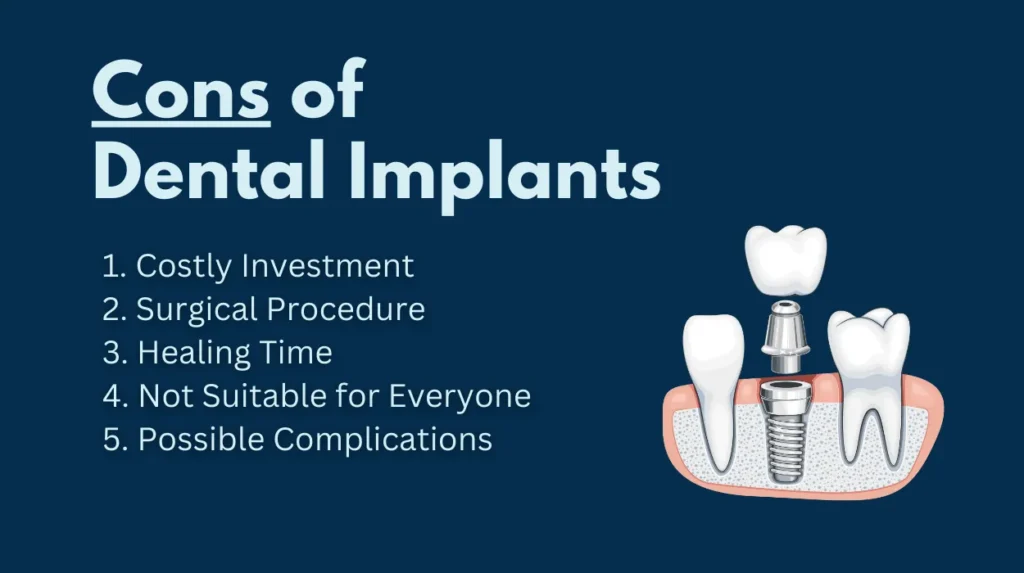
1. Costly Investment
Getting dental implants can be quite expensive. It’s like making a significant purchase that might give you sticker shock. However, think of it as a long-term investment in your smile’s future.
2. Surgical Procedure
The process of getting dental implants involves a surgery-like procedure. While it’s generally safe, some folks may feel a bit anxious about going through it. It’s normal to have concerns about anything involving surgery.
3. Healing Time
After they put in the implant, your mouth needs some time to heal before they can attach the new tooth. Think of it like waiting for a cut to scab over before it’s completely healed. It can vary from person to person.
4. Not Suitable for Everyone
Dental implants aren’t a one-size-fits-all solution. Not everyone can get them. Your dentist will check your mouth and bone health to decide if they’re a good fit for you.
5. Possible Complications
Like with any medical stuff, there can be problems, although they’re not common. You might worry about things like infections, the implant not working, or nerve issues, but these are usually rare and managed by skilled professionals.
What problems can dental implants cause?
Dental implants can sometimes cause problems. Here are some common issues you might face:
- Infection ➞ Sometimes, the area around the implant can get infected. It’s like when you get a cut, and it gets infected – but here, it’s around the implant.
- Pain and Discomfort ➞ After the implant surgery, you might feel some pain or discomfort. It’s like when you have a toothache, but it’s where the implant was put.
- Failure to Fuse ➞ Occasionally, the implant might not fuse or stick properly to your jawbone. It’s like trying to glue two things together, but they don’t stick well.
- Nerve or Tissue Damage ➞ There’s a small chance that nearby nerves or tissues can get hurt during the implant procedure, which can lead to some issues.
- Loosening or Breakage ➞ In rare cases, the implant itself might loosen or even break. Think of it like a screw that comes loose or breaks in something you’re trying to fix.
- Allergic Reactions ➞ Some people can have allergic reactions to the materials used in implants, although this is pretty uncommon.
- Gum Problems ➞ Your gums around the implant can sometimes become swollen or irritated, kind of like when you get a sore spot in your mouth.
What they dont tell you about dental implants?
Here are some things they don’t tell you about dental implants:
➡ Dental implants are not a quick fix. From the initial consultation to the placement of the crown, the entire process of getting dental implants can take several months.
➡ Dental implants necessitate routine maintenance. Dental implants, like natural teeth, must be brushed and flossed on a regular basis. You will also need to visit your dentist on a regular basis for checkups and cleanings.
➡ Dental implants are not indestructible. Even though dental implants are extremely durable, they can be damaged or lost if you are not careful. Avoid chewing on hard objects such as ice or candy, as well as smoking and excessive alcohol consumption.
➡ Dental implants are not suitable for everyone. Certain medical conditions, such as diabetes or osteoporosis, may preclude a person from receiving dental implants. You should also be in good general health and free of any medical conditions that might impede the healing process.
What is the average failure rate of dental implants?
The average failure rate of dental implants is between 2% and 10%. This means that 90% to 98% of dental implants are successful.
The failure rate of dental implants can vary depending on a number of factors, including:
- The skill and experience of the dentist placing the implant
- The quality of the implant used
- The patient’s overall health
- The patient’s oral hygiene habits
Some of the most common causes of dental implant failure include:
- Infection
- Smoking
- Poor oral hygiene
- Injury to the implant
- Bone loss around the implant
When should you not get dental implants?
You should not get dental implants if:
- Not Enough Jawbone ➜ If your jawbone isn’t strong enough or doesn’t have enough space to support an implant, it may not work. Sometimes, you can get procedures to build up your jawbone, but if that’s not an option, implants might not be for you.
- Uncontrolled Health Issues ➜ If you have certain health problems like uncontrolled diabetes or heart issues, it might not be safe to get dental implants. These conditions can make surgery riskier.
- Smoking Habit ➜ Smoking can slow down the healing process after implant surgery and increase the chance of complications. If you’re a smoker, it’s a good idea to quit or at least cut down before considering implants.
- Young Age ➜ If you’re still growing, like in your teenage years, your jawbone isn’t stable yet. It’s best to wait until your jawbone has fully developed before getting implants.
- Pregnancy ➜ It’s usually better to wait until after pregnancy to get dental implants. The changes in your body during pregnancy can affect the success of the implant.
FAQs
What are the pros of dental implants?
Pros of dental implants are natural look and feel, improved function, and long-lasting.
What are the cons of dental implants?
Cons of dental implants are the cost, surgery required, and not suitable for everyone.
Who is a good candidate for dental implants?
Healthy gums and jawbone, good overall health, and no medical conditions that could interfere with healing.
How is dental implant surgery performed?
Dental implant surgery is performed into two stages: implant placement and crown attachment.
What are some things people may not tell you about dental implants?
They are not a quick fix, require regular maintenance, are not indestructible, and are not suitable for everyone.
Final Thoughts
For many people, dental implants can be a game changer, providing a natural and long-lasting solution to missing teeth. However, it is critical to carefully weigh the pros and cons and consult with your dentist to determine if they are the best option for you. Remember that a beautiful, confident smile is within your grasp!
I hope this article was helpful in shedding light on pros and cons of dental implants. If you have any additional questions or require additional information, please comment down below. Your smile is priceless!
